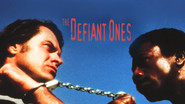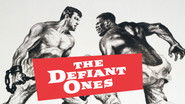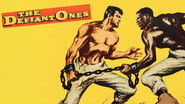grantss
A prison truck is transporting a group of convicts when it runs off the road and crashes. Two convicts escape - Johnny (Tony Curtis), a white man, and Cullen (Sydney Poitier), a black man. They loathe each other, especially as Johnny is an ignorant racist. However, they are chained together and have to rely on each other to escape and survive. Meanwhile, the State Police plus the local Sheriff and a ragtag bunch of deputies, assisted by tracker dogs, are hot on their trail...Excellent movie. In the 1950s this would have been incredibly revolutionary, socially progressive and a great moral tale. Even today, with society more tolerant, it is a wonderful story of friendship and tolerance with a powerful anti-prejudice message.While it might seem obvious where the story is going, how it gets there is never predictable, or dull. Director Stanley Kramer weaves a great story, filled with red herrings, detours and setbacks. Much symbolism in some of the smallest of gestures and acts and the dialogue is filled with some powerful, quotable lines.Balancing the drama is the lighter side of the story - the police. Scenes involving them are often funny, not to make them seem like buffoons or make light of their attempts to track the convicts, but really just to lighten the mood.Great work by Sydney Poitier as Cullen. Tony Curtis is less convincing (the accent!), but does okay. Both picked up Oscar nominations for their efforts. Theodore Bickel is great as the Sheriff - his laid- back way of doing things made for some great comedy. He also got an Oscar nomination, as did Cara Williams.Somehow this movie did not win the 1959 Best Picture Oscar. In one of the worst decisions in Oscar history, the award went to the incredibly weak and dull Gigi, one of the worst ever Best Picture winners. Maybe the Academy was just into musicals that year...
PimpinAinttEasy
With some movies, you just know you're going to enjoy them from the first scene itself. The Defiant Ones begins in a truck transporting criminals. You hear a song and for a moment you're fooled into thinking that it is the title tune or something. But soon you realize its the people in the truck silently suffering Sidney Poitier's singing skills.It is a film where things happen really fast. The director does not waste too much time on a single scene. The film offers quite a bit of social commentary on human nature and race relations. Nothing particularly enlightening or anything but it is a really entertaining film. It is also a tale of friendship I guess. Friendship between two men. Both Tony Curtis and Sidney Poitier were great. I don't know what else to say. They must have been really fit when they made this because they literally galloped across the terrain. The rural milieu across which the two convicts run/gallop was very pleasant to look at.The interlude where the woman seduces Curtis was very interesting. Nothing like an evil woman to destroy the intense friendship between two men. Stanley Kramer made the very watchable Oklahoma Crude and he shoots outdoor scenes very well.
raymond_chandler
"The Defiant Ones" gave me a whole lot more than I had expected. I always had thought this was a semi-sensational action film that exploited racism to attract notoriety. It actually is a poignant story of two men on the run who must cooperate in spite of their mutual animosity. The original screenplay by Nedrick Young and Harold Jacob Smith won the Oscar for 1958, and I am hard-pressed to think of a script more deserving of every accolade possible. Joker Jackson (Tony Curtis, a revelation) and Noah Cullen (Sidney Poitier, fierce and fatalistic) are chained together and are in flight from a posse of local deputies led by Sheriff Max Muller (Theodore Bikel) and State Trooper Capt. Frank Gibbons (Charles McGraw). The ongoing quarrels between the two pairs of mismatched partners throughout the film paints a vivid picture of life in the rural South of the 1950s. Bikel is simply stunning in his offhand performance as the humanitarian leader of the manhunt, and McGraw is unyielding in his determination to bring in the escapees swiftly and by any means necessary. Claude Akins is intimidating in a small role as the inhabitant of a work camp the prisoners stumble across. Lon Chaney Jr. dominates the screen during this passage, as we learn that he has good reason to empathize with Joker and Cullen (as Curtis calls Poitier). The duo ultimately seek refuge at the modest farm of an unnamed and abandoned single mother and her child. This portion of the film becomes a vignette straight out of a Tennessee Williams play, and the heat radiating from Cara Williams could warm an entire Arctic outpost.I cannot stress enough how fine the acting is by the entire cast. I have never seen Tony Curtis do such good work, and Poitier is excellent as always, with a a haunting mix of melancholy and mirth that is best displayed by his boisterous rendition of William C. Handy folk song "Long Gone" at key points in the movie. Cara Williams is riveting every second she is on screen, and Lon Chaney Jr. acts as a counterbalance to the casual prejudice of the other Caucasian characters. The various Southern accents are underplayed but lend authenticity to the dialogue, as do sundry colloquialisms they use. Stanley Kramer, a well-known social activist, directs the film without judgement, as the actions of the players speak for themselves. I cannot find a single flaw in "The Defiant Ones", and I have no choice but to give it the Highest Recommendation possible."I fill it up wit' dreams."
berberian00-276-69085
Before anything else I wish to stipulate here, that this writing is non-partisan one and has nothing to do with any form of racism, communism or whatsoever deviant behavior - cf., "Defiant Ones" (1958) and also less prominent remake with Carl Weathers and Robert Urich in 1986. If Stanley Kramer dared to produce this movie in 1958 and Tony Curtis (White Male Caucasian) participate in principal leading role, subsequently I don't see reason to swell 60 years later when about half of Hollywood actors are colored and Film Industry in the making depend on this people. The reason I took this small undertaking is to try (if possible) to dispel the myth of African American Culture, its boundaries and genesis, and its role in interpreting current history of USA and all English speaking people on this planet Earth. It's a fair coin, I think both Blacks and Whites should understand me."The Defiant Ones" (1958), gave Sidney Poitier his first Academy Award nomination as Best Actor. Five years later, he won the Oscar for "Lilies of the Field" (1963), the first African American to win for a leading role. His roles in "Guess Who's Coming to Dinner" (1967) and "To Sir, with Love" (1967) were for their time landmarks in the breaking down of social barriers between African Americans and Whites.I took the paragraph above as citation from IMDb. Certainly its a good place here to mention some other Black American film stars that I have remembered vividly in the 1960s, 1970s and 1980s - Harry Belafonte, Jim Brown, Fred Williamson, Yaphet Kotto, James Earl Jones, Richard Pryor (died of dementia in 2005), Eddie Murphy, etc. Those were people that single-handedly could perform and produce a good Movie for the Big Audience. There are other names that I have missed maybe, but as a rule good Films in those times were the ones that were remembered. In the 1990s already African Americans in Hollywood Films became a cliché, there were so many nominations and deserved medleys that I am not in position right now to make an appreciation.I will go further a little bit. I am a self-conscious citizen and read all kind of literature (on equal opportunity). I have books in my library on Black Racism and White Racism, the way it started in the American Southwest from the years of 1860 and on. Mass Organizations such as Ku Klux Clan appeared as reaction on the loosing Confederate side. As counter reaction the free Black Americans left their cluster Southern States and migrated internally East and West all over USA. They started to study Culturally and Physically in High Schools and Universities. They interbreed freely in marriages with Whites and casted a singular alloy of racial unity - namely, Mulattos (if you can distinguish them physically) are as good as Blond or Brunette Whites. So what's the case here? Why are we still reading pieces of literature like "We Charge Genocide" (1951) by Civil Rights Congress on pages of Wikipaedia. It's high time for reconciliation ...








